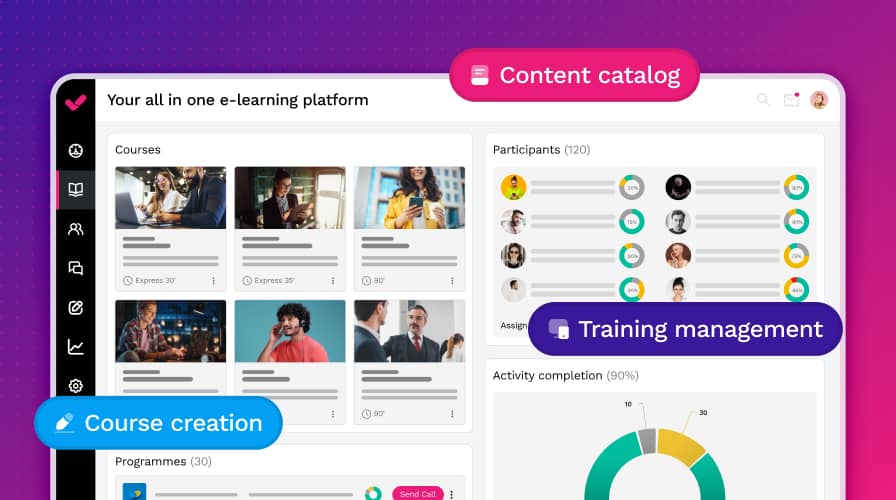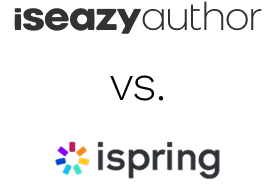November 21, 2024
Comparison of the 10 best e-learning platforms
CONTENT CREATED BY:

Table of contents
Choosing the right e-learning platform is essential for any company that wants to optimize its training processes. These platforms make it possible to distribute training content quickly and easily, ensuring the comprehensive management of all corporate training and knowledge processes. However, not all e-learning platforms are the same.
The ability to create calls, manage communications, issue certifications and generate detailed reports on training progress – not to mention an intuitive interface and the option to customize learning – are all factors that a platform should offer if it wants to be considered one of the best on the market. Are you curious about which platforms meet these criteria? We provide the answers below.
What features should the best e-learning platform have?
Choosing the right platform for your business will depend on the specific needs of your organization and the type of training you want to offer. However, there are several key features that really make the difference amongst the best competitors:
Comprehensive management
The best e-learning platforms allow leaders to manage the complete training cycle of their team. This should cover everything from the identification of training needs, to planning by group or area of knowledge, and finally to execution and impact assessment. In addition, the platform should offer features and automations to streamline processes such as calls, notifications, document management, the issuing of certificates and more.
Customization options
Personalization is a key differentiator in e-learning platforms. These features should allow companies to adapt the learning experience to their specific needs and those of students. This typically includes the option to design unique learning pathways, as well as customize the visual interface of courses, so that they match user preferences and reflect the corporate identity of your organization.
Some platforms even give the option to access learning through mobile devices. This not only increases the reach of training, but also allows employees to learn whenever and wherever they want, making learning more timely, relevant and effective.
Analytics and reports
Today, AI is what truly makes the difference. The most innovative e-learning platforms integrate artificial intelligence to personalize training, improve operational efficiency, and enhance the overall learning experience. This includes intelligent recommendation engines that suggest relevant content based on each user’s profile, AI-powered authoring tools that allow the creation of interactive courses in minutes, and automation features that free training teams from repetitive tasks.
Artificial Intelligence applied to learning
Implementing motivational elements into training, such as rewards and tokens of recognition, increases interest in the educational process. The best e-learning platforms offer learning experiences that integrate gamification features, which encourage students to participate more actively in their learning. Incorporating games and challenges into training programs not only makes content more fun and exciting, but also helps users to better retain information.
A range of subscription plans
E-learning platforms that offer a variety of subscription plans often have a competitive advantage, as they allow companies to select the plan that best matches their size and needs. Platforms such as isEazy LMS offer plans tailored to different capacities, from small groups to big organizations.
This flexibility is crucial for companies, since each will have its own unique requirements and motivations for training. The ability to choose from multiple subscription plans makes it easier for organizations to grow, scaling their training efforts according to demand.
Types of e-learning platforms
The e-learning platform market is home to a wide variety of options designed to meet different educational needs. They might be targeted at organizations seeking technological solutions to enhance the effectiveness of their training initiatives, or even at individuals or academic institutions. Amongst the various types of e-learning platform available, the best known include:
Corporate e-learning platforms
These software systems are developed and offered by companies who specialize in training technology. Such platforms usually include advanced management and customization features, making them an ideal choice for organizations seeking a complete technological solution. In addition, as they are provided as commercial services, they also come with technical support and frequent updates. The best ones allow for rapid implementation and flexible configuration, adapting to a wide variety of sectors and users without requiring advanced technical knowledge.
Open source e-learning platforms
Unlike other platforms on the market, open source options are free and offer full access to the source code. This allows them to be heavily adapted to the specific needs of each user. The most popular choices even attract active communities of developers who create and share plugins or discuss news and updates. However, as you might expect, these platforms usually require greater technical knowledge for their implementation and use.
E-learning marketplace platforms
An e-learning marketplace platform functions as an online catalog or market, where content creators and educators can offer their courses to a wider audience. These platforms allow users to access a diverse variety of courses in one place, and are typically designed for a mass audience, with training topics ranging from technical skills to personal development. They frequently offer monetization options for content creators, whilst giving users the freedom to browse and choose courses based on their needs and interests.
Cloud-based e-learning platforms (SaaS)
Cloud-based e-learning platforms (or SaaS – Software as a Service) allow for course management and access to content to be managed over the internet, without the need for local installations. This type of platform adapts easily to different devices, making mobile education a possibility. In general, they can be accessed through any device with an internet connection, which also makes them easier to update.
The 10 best e-learning platforms
Now that you know about the different types of e-learning platform available, and have a good understanding of their most important features, it’s time to discover the 10 best e-learning platforms on the market. To help you make the right decision, we’ve prepared a side-by-side comparison so you can see which platform works best for you:
1. isEazy LMS
isEazy LMS is an all-in-one training platform that harnesses the power of artificial intelligence to completely transform how companies design, manage, and scale their training strategies. With a sleek, modern interface, it delivers a fluid, highly personalized learning experience that captures attention and drives progress.
Its smart recommendation engine helps each user quickly find the right course based on their unique skills, interests, and development needs. The built-in authoring tool allows you to create interactive content effortlessly, with intelligent features like auto-translation, voiceovers, subtitles, and AI-generated exercises and visuals.
All of this is backed by powerful automation capabilities for course launches, communications, and notifications, plus a dynamic dashboard that lets you track learning impact across the entire organization in real time. With isEazy LMS, companies can roll out smarter, more scalable training—fully aligned with their talent development goals—without the complexity.

Key features
Ratings
Plans & pricing
- Learning platform: Manage all training from one central hub. Launch automated enrollments and reminders, control role-based permissions, and plan annual training by team, department, or region using dynamic filters.
- Analytics: Turn data into action. Measure training impact by user or department, identify top performers, and generate clear, detailed reports to fine-tune your strategy.
- Learning experience: Offer an engaging, intuitive interface with course cards for urgent, featured, or personalized training. Includes built-in announcements, news, and a smart AI course recommender.
- Content library: Access 500+ ready-to-use courses in multiple languages and categories like leadership, compliance, soft skills, and digital productivity—all managed from your LMS.
- AI-powered authoring tool: Create your own interactive courses up to 10x faster. Import from PowerPoint, edit with ease, and enhance with automatic voiceovers, subtitles, avatars, images, and AI-generated exercises.
- Capterra Rating: 5/5 stars.
- G2 Rating: 5/5 stars.
- Professional: Up to 100 users. Includes unlimited courses, admin roles, and learning environments.
- Business: Up to 200 users. Includes everything in the Professional plan plus advanced dashboards for managers.
- Enterprise: 201+ users. Includes all Business plan features, plus a dedicated Customer Success Manager and custom integrations.
Key features
- Learning platform: Manage all training from one central hub. Launch automated enrollments and reminders, control role-based permissions, and plan annual training by team, department, or region using dynamic filters.
- Analytics: Turn data into action. Measure training impact by user or department, identify top performers, and generate clear, detailed reports to fine-tune your strategy.
- Learning experience: Offer an engaging, intuitive interface with course cards for urgent, featured, or personalized training. Includes built-in announcements, news, and a smart AI course recommender.
- Content library: Access 500+ ready-to-use courses in multiple languages and categories like leadership, compliance, soft skills, and digital productivity—all managed from your LMS.
- AI-powered authoring tool: Create your own interactive courses up to 10x faster. Import from PowerPoint, edit with ease, and enhance with automatic voiceovers, subtitles, avatars, images, and AI-generated exercises.
Ratings
- Capterra Rating: 5/5 stars.
- G2 Rating: 5/5 stars.
Plans & pricing
- Professional: Up to 100 users. Includes unlimited courses, admin roles, and learning environments.
- Business: Up to 200 users. Includes everything in the Professional plan plus advanced dashboards for managers.
- Enterprise: 201+ users. Includes all Business plan features, plus a dedicated Customer Success Manager and custom integrations.
2. Netex Learning
Netex is an e-learning platform with a focus on social learning. This platform is designed to help with the development of creative training strategies and the renewal of team skills. It comes with a built-in authoring tool for generating new content, and a transcript area where learners can review their training history and awards achieved.

Key features
Ratings
Plans & pricing
- Multi-organization and multi-language (works for multiple organizations, each with their own training offering and target users).
- Scalable.
- Built-in authoring tool.
- Analytics dashboards.
- Learning pathway editor.
- Recommendation system.
- Requirements system.
- Mobile, gamification, and social learning.
- Content marketing (tools to promote courses within the portal).
- Integrates with spreadsheets, CRM, ERP, MTeams, project managers and more.
- G2 rating: 4.5/5 stars.
- Per-user plans (charged according to each user that uses the platform).
Key features
- Multi-organization and multi-language (works for multiple organizations, each with their own training offering and target users).
- Scalable.
- Built-in authoring tool.
- Analytics dashboards.
- Learning pathway editor.
- Recommendation system.
- Requirements system.
- Mobile, gamification, and social learning.
- Content marketing (tools to promote courses within the portal).
- Integrates with spreadsheets, CRM, ERP, MTeams, project managers and more.
Ratings
- G2 rating: 4.5/5 stars.
Plans & pricing
- Per-user plans (charged according to each user that uses the platform).
3. Cornerstone on demand
Cornerstone is a cloud-based e-learning platform that allows you to assign, automate and track learning. Cornerstone aims to accelerate workforce and talent mobility, and its integrated apps enable users to learn from anywhere, while aiding administrators to automate workflows and gain insights into program efficiency.

Key features
Ratings
Plans and pricing
- Workflows.
- Talent management tools.
- Reporting.
- Subscriptions to exclusive content.
- Mobile learning and gamification.
- Native LXP.
- Intuitive interface.
Social learning.
Compliance tracking.
SaaS. SCORM, xAPI compatible.
Integrates with HRIS, CRM, and other enterprise applications.
- Capterra Rating: 4.3/5 stars.
- G2 Rating: 4.1/5 stars.
- Plans vary according to institution, features, and number of users.
Key features
- Workflows.
- Talent management tools.
- Reporting.
- Subscriptions to exclusive content.
- Mobile learning and gamification.
- Native LXP.
- Intuitive interface.
Social learning.
Compliance tracking.
SaaS. SCORM, xAPI compatible.
Integrates with HRIS, CRM, and other enterprise applications.
Ratings
- Capterra Rating: 4.3/5 stars.
- G2 Rating: 4.1/5 stars.
Plans and pricing
- Plans vary according to institution, features, and number of users.
4. Docebo
Docebo is a SCORM-compliant e-learning platform designed to deliver learning experiences in corporate environments. Its most interesting features include its intuitive interface, customization options, and integration with external tools. Its AI-powered software offers personalized content recommendations and skills updates based on user experience and company needs.

Key features
Ratings
Plans & pricing
- Personalized learning pathways.
- AI-powered enrollment suggestions for administrators and managers.
- Bulk actions.
- Notifications and gamification.
- Online and in-person learning (mainly for enterprise).
- Intuitive interface.
- Administrative task automation.
- My Team tool to monitor learning activities.
- Checklists.
- Scalable.
- SaaS. Support. SSO.
- SCORM compatible.
- Integrates with HCM/HRIS, CRM, eCommerce.
- Capterra rating: 4.4/5 stars.
- G2 Rating: 4.3/5 stars.
- Customizable plans. Varies according to institution and number of users.
Key features
- Personalized learning pathways.
- AI-powered enrollment suggestions for administrators and managers.
- Bulk actions.
- Notifications and gamification.
- Online and in-person learning (mainly for enterprise).
- Intuitive interface.
- Administrative task automation.
- My Team tool to monitor learning activities.
- Checklists.
- Scalable.
- SaaS. Support. SSO.
- SCORM compatible.
- Integrates with HCM/HRIS, CRM, eCommerce.
Ratings
- Capterra rating: 4.4/5 stars.
- G2 Rating: 4.3/5 stars.
Plans & pricing
- Customizable plans. Varies according to institution and number of users.
5. 360Learning
360Learning is a platform that combines formal learning with social learning. Because of this, it is aimed primarily at organizations seeking to promote participatory learning and collaborative content creation. This e-learning platform stands out by offering a mobile app for flexible online training. In addition, it integrates with popular tools such as Google Drive and Zoom.

Key features
Ratings
Plans & pricing
- Social learning and collaborative content creation.
- Mobile learning and gamification.
- Detailed analysis and reports.
- Intuitive interface.
- Learner management (self-registration, data synchronization with HCM or HRIS platform, group segmentation, permissions assignment).
- Content creation (course templates, surveys, quizzes, integrated video recorder).
- Synchronous and asynchronous learning environment.
- Customizable learning pathways.
- Facilitates collaboration and knowledge sharing.
- Integrates with productivity tools and content platforms (Coursera, Udemy Business, Loom, Canva, Zoom, Google Drive, Salesforce, Slack).
- Capterra rating: 4.6/5 stars.
- G2 rating: 4.6/5 stars.
- Team: $8 USD per user/month – up to 100 users.
- Business: Customizable plans.
Key features
- Social learning and collaborative content creation.
- Mobile learning and gamification.
- Detailed analysis and reports.
- Intuitive interface.
- Learner management (self-registration, data synchronization with HCM or HRIS platform, group segmentation, permissions assignment).
- Content creation (course templates, surveys, quizzes, integrated video recorder).
- Synchronous and asynchronous learning environment.
- Customizable learning pathways.
- Facilitates collaboration and knowledge sharing.
- Integrates with productivity tools and content platforms (Coursera, Udemy Business, Loom, Canva, Zoom, Google Drive, Salesforce, Slack).
Ratings
- Capterra rating: 4.6/5 stars.
- G2 rating: 4.6/5 stars.
Plans & pricing
- Team: $8 USD per user/month – up to 100 users.
- Business: Customizable plans.
6. Talent LMS
Talent LMS is a cloud-based, SCORM-compliant e-learning platform that makes it easy to create and manage courses, as well as learning activities. It offers an intuitive interface that makes it easy to manage in-person and online courses, oversee users, as well as access assessment and reporting tools.

Key features
Ratings
Plans & pricing
- Learning pathways.
- Online, hybrid.
- Detailed reports.
- Social learning, mobile learning, and gamification.
- Bulk actions.
- Platform customization options.
- Blended learning.
- E-commerce feature for the sale of individual or subscription courses.
- Responsive design and intuitive interface.
- Scalable.
- TalentLibrary (course library).
- Support.
- SaaS. SCORM-compliant.
- Third-party integrations.
- Capterra rating: 4.7/5 stars.
- G2 rating: 4.6/5 stars.
- Core – $69/month up to 20 users.
- Grow – $109/month up to 20 users.
- Pro – $139/month up to 20 users
- Enterprise – Starts with 1000 users – custom plan.
Key features
- Learning pathways.
- Online, hybrid.
- Detailed reports.
- Social learning, mobile learning, and gamification.
- Bulk actions.
- Platform customization options.
- Blended learning.
- E-commerce feature for the sale of individual or subscription courses.
- Responsive design and intuitive interface.
- Scalable.
- TalentLibrary (course library).
- Support.
- SaaS. SCORM-compliant.
- Third-party integrations.
Ratings
- Capterra rating: 4.7/5 stars.
- G2 rating: 4.6/5 stars.
Plans & pricing
- Core – $69/month up to 20 users.
- Grow – $109/month up to 20 users.
- Pro – $139/month up to 20 users
- Enterprise – Starts with 1000 users – custom plan.
7. Adobe Learning Manager
Adobe Learning Manager, previously known as Adobe Captivate Prime, is a SCORM-compliant e-learning platform designed for learning management in enterprise environments. It integrates with a wide variety of enterprise-branded applications, and offers machine learning and artificial intelligence features to personalize training.

Key features
Ratings
Plans and pricing
- AI-based personalization and recommendations.
- Unified, experience-based learning.
- Social learning, mobile learning and gamification.
- Detailed reports.
- Learning pathways.
- Support for learning in hybrid classrooms.
- Machine learning and artificial intelligence.
- Responsive design and intuitive interface.
- Guided learning pathways.
- Scalable.
- SSO. Integrates with content providers, Salesforce, Adobe Market Engage, Microsoft Power BI, FTP connector.
- Capterra rating: 4.3/5 stars.
- G2 rating: 4.0/5 stars.
- Customizable plans. Varies according to institution and number of users.
Key features
- AI-based personalization and recommendations.
- Unified, experience-based learning.
- Social learning, mobile learning and gamification.
- Detailed reports.
- Learning pathways.
- Support for learning in hybrid classrooms.
- Machine learning and artificial intelligence.
- Responsive design and intuitive interface.
- Guided learning pathways.
- Scalable.
- SSO. Integrates with content providers, Salesforce, Adobe Market Engage, Microsoft Power BI, FTP connector.
Ratings
- Capterra rating: 4.3/5 stars.
- G2 rating: 4.0/5 stars.
Plans and pricing
- Customizable plans. Varies according to institution and number of users.
8. Moodle
Moodle is a free or open-source e-learning platform that offers extensive customization options. It is one of the most popular free learning management platforms, focusing primarily on academic learning. It offers integrations with third-party platforms and content repositories, and allows for the automation of certain manual tasks. However, while it can be used for training purposes, access to more advanced features requires a Moodle Workspace subscription.

Key features
Ratings
Plans and pricing
- Free, open-source platform.
- Large, active support community.
- Wide variety of plugins and themes available.
- SCORM compliant.
- Learner progress tracking.
- Communication tools such as forums and instant messaging.
- Activity dashboard.
- Training management (notifications, search filters, learner portal, assessment management).
- Online and in-person (higher education, professional education, and corporate).
- Social learning, mobile learning and gamification.
- Customization options (other open source plugins, customizable themes, etc.)
- Student management (users, advanced reporting tools, enrollments and notifications).
- Capterra rating: 4.3/5 stars.
- G2 rating: 4.1/5 stars.
- Open source.
- Moodle Workspace: price based on hosting and contracted services.
Key features
- Free, open-source platform.
- Large, active support community.
- Wide variety of plugins and themes available.
- SCORM compliant.
- Learner progress tracking.
- Communication tools such as forums and instant messaging.
- Activity dashboard.
- Training management (notifications, search filters, learner portal, assessment management).
- Online and in-person (higher education, professional education, and corporate).
- Social learning, mobile learning and gamification.
- Customization options (other open source plugins, customizable themes, etc.)
- Student management (users, advanced reporting tools, enrollments and notifications).
Ratings
- Capterra rating: 4.3/5 stars.
- G2 rating: 4.1/5 stars.
Plans and pricing
- Open source.
- Moodle Workspace: price based on hosting and contracted services.
9. SAP Litmos
SAP Litmos is another of the most easy-to-integrate and intuitive e-learning platforms. It offers, amongst other features, task automation, user management, a content library and an integrated authoring tool.

Key features
Ratings
Plans and pricing
- Analysis and reports.
- Platform customization options.
- Built-in course creation tool.
- Social learning, mobile learning, and gamification.
- E-commerce management.
- Intuitive interface.
- Content library.
- SaaS. Support.
- Integrates with Salesforce, Bambú HR, Mailchimp and others.
- SCORM compatible.
- Capterra rating: 4.2/5 stars.
- G2 rating: 4.2/5 stars.
- Free trial.
- Foundation Suite.
- Premier Suite.
- Platinum Suite.
- Varies according to institution, features, and number of users.
Key features
- Analysis and reports.
- Platform customization options.
- Built-in course creation tool.
- Social learning, mobile learning, and gamification.
- E-commerce management.
- Intuitive interface.
- Content library.
- SaaS. Support.
- Integrates with Salesforce, Bambú HR, Mailchimp and others.
- SCORM compatible.
Ratings
- Capterra rating: 4.2/5 stars.
- G2 rating: 4.2/5 stars.
Plans and pricing
- Free trial.
- Foundation Suite.
- Premier Suite.
- Platinum Suite.
- Varies according to institution, features, and number of users.
10. Schoology
If you’re looking for a customizable e-learning platform suited to academic learning, then Schoology is ideal as it allows you to create personalized learning pathways and experiences to match the needs of each student. The platform centralizes access to data on both the overall study plan and student performance, and facilitates planning and resource allocation, providing real-time reports to enhance decision making.

Key features
Ratings
Plans & pricing
- Online and blended learning (schools, educational centers and families).
- Collaborative and communication tools.
- Assessments and data analysis.
- Intuitive interface.
- PowerBuddy personal assistant.
- Social learning tools.
- User community and support.
- Adaptable for different educational levels.
- SaaS.
- SCORM compatible.
- Integrates with Google Drive, Microsoft OneDrive, and other educational applications.
- Capterra rating: 4.4/5 stars.
- G2 rating: 4.4/5 stars.
- Plans vary according to institution, features, and number of users.
Key features
- Online and blended learning (schools, educational centers and families).
- Collaborative and communication tools.
- Assessments and data analysis.
- Intuitive interface.
- PowerBuddy personal assistant.
- Social learning tools.
- User community and support.
- Adaptable for different educational levels.
- SaaS.
- SCORM compatible.
- Integrates with Google Drive, Microsoft OneDrive, and other educational applications.
Ratings
- Capterra rating: 4.4/5 stars.
- G2 rating: 4.4/5 stars.
Plans & pricing
- Plans vary according to institution, features, and number of users.
isEazy LMS: The All-in-One AI-Powered Solution for Ambitious Companies
If you’re looking for a training platform that goes beyond the basics, isEazy LMS is your perfect partner. This all-in-one LMS harnesses the power of AI to transform every stage of the training process—from content creation to impact analysis.
Its comprehensive approach simplifies administration, automates workflows, and empowers teams to create personalized content with AI. You can roll out learning paths by role, access 500+ ready-to-use courses, and manage it all from a single, streamlined solution.
With flexible plans, intelligent features, and a streaming-like user experience, isEazy LMS isn’t just built to fit your business—it’s designed to drive it forward. Ready to take the leap? Request your demo today.
Frequently Asked Questions on e-learning platforms
What factors should I take into account when choosing an e-learning platform for my company?
It is important to thoroughly evaluate a range of factors in a platform, such as: its customization options; its ability to comprehensively manage training (calls, certifications, reports); user experience (intuitive interface); compatibility with mobile devices; and analytics and reports that allow for the detailed monitoring of training progress and impact.
What is the key difference between an LMS and an LXP?
An LMS is primarily designed to manage and deliver structured training courses, including assessments and certifications. It is particularly helpful for ensuring regulatory compliance and maintaining detailed training records. An LXP, on the other hand, focuses on offering a personalized, user-driven learning experience, taking advantage of artificial intelligence algorithms to recommend relevant content to users.
Why are SCORM and other compatibility standards important in an e-learning platform?
Support for SCORM and other standards, such as xAPI or AICC, ensures that training content can be easily integrated and shared across different platforms. This allows for the reuse of learning materials and makes it easier to track student performance, ensuring more effective and flexible training.
What benefits does gamification offer in e-learning platforms?
Gamification makes use of elements such as challenges, rewards and recognition to motivate users to complete courses. This increases engagement and helps improve knowledge retention. Platforms that offer gamification, such as isEazy LMS, have the power to transform learning into a more involving and dynamic experience.
Do you need e-learning tools for your company?
We help you according to your needs
Request a demoTry it free










